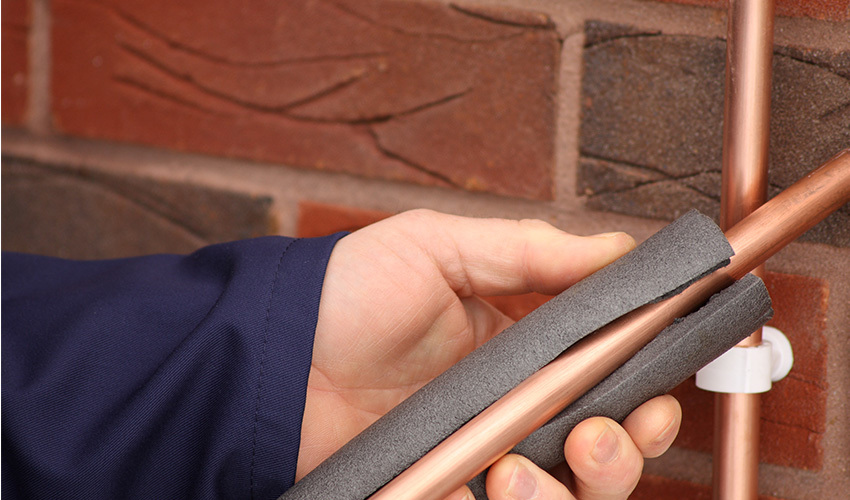Call This Tuesday to Get $35 OFF
Call This Tuesday to Get $35 OFF

January 01
Pipe insulation is integral to many industries, including HVAC, plumbing, and construction. Insulation material applied to pipes helps prevent heat loss, lower energy consumption and protect against freezing, resulting in pipe repair - these benefits make pipe insulation one of the essential aspects of HVAC, plumbing, and construction operations. This comprehensive guide by Mr. Rooter Plumbing will explore its many uses, including its benefits as a DIY project and the costs associated with pipe insulation.
Pipe insulation provides many benefits to homebuyers, business owners, and industries alike. One primary benefit is energy conservation - insulation reduces heat loss to reduce energy consumption and bills and prevents heat gain, which is especially helpful in warmer climates. Furthermore, insulation prevents temperature control.
Insulated pipes offer another significant environmental advantage in terms of reduced greenhouse gas emissions. When energy usage decreases, fewer greenhouse gasses enter the atmosphere - helping create a more sustainable environment by decreasing fossil fuel demands.
Pipe insulation can significantly extend the lifespan of pipes by protecting against external factors like weather and physical impact, corrosion, and rust that may lead to leakage and costly repairs. Insulation also protects against external influences like weathering that could otherwise damage their integrity, including physical impact or weather-related events such as extreme temperatures.
Pipe insulation works by minimizing heat transfer between pipes and their environments, using insulation material designed as a poor conductor of heat that prevents it from passing easily through.
Insulation material acts as a buffer between pipes and their environment, limiting heat loss from them and therefore decreasing energy requirements to maintain desired fluid temperatures within.
Different kinds of pipe insulation are widely available on the market, each offering its own set of advantages and features. Common types include:
Polyethylene foam insulation is an affordable and convenient choice, thanks to its affordability and ease of installation. As it is lightweight and flexible, Polyethylene foam is suitable for low-temperature applications between -60 ? to 200 ? and has various thickness options.
Rubber insulation is an extremely flexible material designed for high-temperature applications, resisting moisture, UV radiation, and chemicals to provide reliable performance at temperatures from -40 ? to 250 ?.
Fiberglass insulation is an incredibly popular choice in residential and commercial settings, comprising glass fibers fashioned into batts or rolls for convenient installation. Furthermore, this material can withstand temperatures as high as 850 ? without becoming compromised in its structure.
Mineral wool insulation is constructed from natural rock or mineral fibers. As it's fire-proof and suitable for high-temperature applications (up to 1200degF), mineral wool can offer great fireproof protection.
Easy Installation and Superior Insulation Performance is an easily installed reflective insulation material with exceptional thermal insulation properties, ideal for low-temperature applications between -40 ? to 180 ?. It provides thermal protection with minimal effort.
Pipe insulation with the highest R-value is the most cost-effective. R-value measures how well insulation resists heat flow; thus, a higher R-value indicates greater effectiveness at preventing heat transfer through insulation.
Fiberglass insulation boasts one of the highest R-values among popular forms of pipe insulation, reaching up to an R-value of 6.5 per inch of thickness. Mineral wool insulation also ranks highly, boasting an R-value of up to 8 per inch thickness.
Selecting an insulation material depends on several considerations, including its intended application, temperature range, and budget. To maximize efficiency, insulation must have an R-value that fits.
Insulation plays a pivotal role in keeping pipes from freezing over the winter season, which could result in costly repairs if left to freeze unprotected. The most suitable insulation to prevent freezing would provide sufficient protection and withstand low temperatures.
Rubber insulation is an effective choice for preventing freezing as it can withstand temperatures as low as -40 ? and resist moisture, helping prevent ice formation on pipes. Mineral wool insulation offers additional insulating benefits with temperatures reaching 1200 ? and its superior insulating properties.
Pipe insulation can be completed without professional assistance by homeowners and businesses with basic handyman skills. Still, installation must follow manufacturer instructions and safety regulations to avoid reduced insulation efficiency, water damage, or fire risks. Improper installation could result in reduced efficiency, damaged insulation material, or fire hazards.
Professional insulation contractors should always be the go-to choice when undertaking complex insulation projects in commercial or industrial settings. Their skills, tools, and experience allow them to ensure proper installation with maximum insulation efficiency.
Cost estimates for pipe insulation depend on many variables, such as the type of insulation used, pipe size/length/height dimensions, and installation method. Fiberglass and mineral wool insulation is more costly than foam or foil solutions.
On average, pipe insulation and labor costs range between $1.10 to $11 per linear foot. Insulation expenses can add up quickly for large commercial or industrial projects; however, its benefits - energy savings and pipe protection - often far outweigh its initial expense.
At Mr. Rooter Plumbing, we recognize the significance of pipe insulation to prevent heat loss, reduce energy usage and shield against freezing. Our team of talented and experienced professionals offers comprehensive pipe insulation services, such as installation, pipe repair, and pipe replacement. A reliable plumber can also offer expert advice on selecting and applying insulation materials and thickness to meet the unique requirements of each homeowner, business owner, or industrial facility manager. Call today to set up a consultation and experience the Mr. Rooter Plumbing difference!
